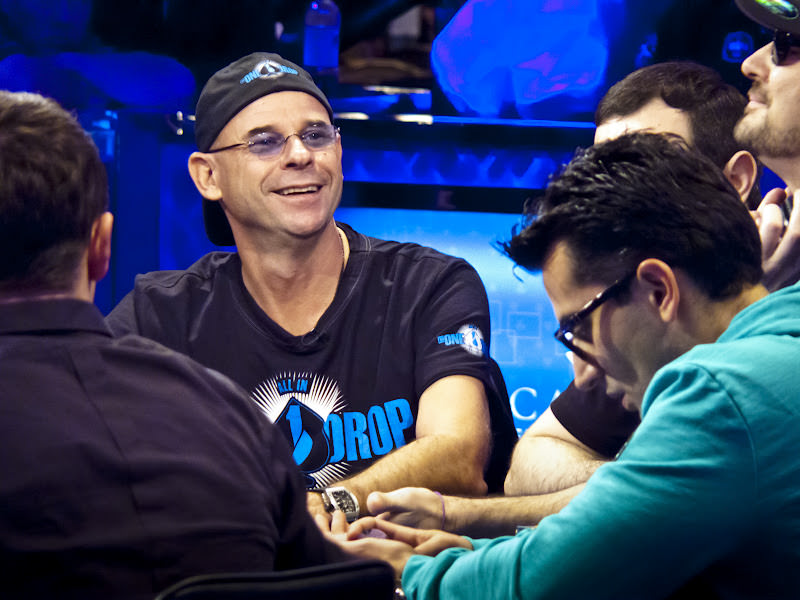 Die von Jeff Ifrah angekündigten Statements von Full Tilt Poker scheinen keine leeren Versprechungen zu sein. Allerdings hat FTP einen seltsamen Weg gewählt und einmal mehr die Pressemitteilung nur an ausgewählte Vertreter der Medien geschickt. So tauchte gestern ein Artikel beim Forbes Magazine auf und zuerst schien es, als ob Autor Nathan Vardi, der Einzige wäre, dem das Schreiben vorliegt.
Die von Jeff Ifrah angekündigten Statements von Full Tilt Poker scheinen keine leeren Versprechungen zu sein. Allerdings hat FTP einen seltsamen Weg gewählt und einmal mehr die Pressemitteilung nur an ausgewählte Vertreter der Medien geschickt. So tauchte gestern ein Artikel beim Forbes Magazine auf und zuerst schien es, als ob Autor Nathan Vardi, der Einzige wäre, dem das Schreiben vorliegt.
 Vardi scheint es jedoch von PokerStrategy zugespielt bekommen zu haben, wie nun Jeff Ifrah im 2+2 angedeutet hat. Inzwischen haben auch die Leute von Subject Poker die Mitteilung vorliegen und wir haben von dort das Presseschreiben für euch am Ende des Artikels kopiert. Doch genug der Quellenangaben und zurück zur eigentlichen Mitteilung. Aus dem Schreiben kann man folgende Dinge erfahren.
Vardi scheint es jedoch von PokerStrategy zugespielt bekommen zu haben, wie nun Jeff Ifrah im 2+2 angedeutet hat. Inzwischen haben auch die Leute von Subject Poker die Mitteilung vorliegen und wir haben von dort das Presseschreiben für euch am Ende des Artikels kopiert. Doch genug der Quellenangaben und zurück zur eigentlichen Mitteilung. Aus dem Schreiben kann man folgende Dinge erfahren.
Schon vor dem 15. April 2011 hat die Regierung der Vereinigten Staaten Spielergelder in Höhe von $115.000.000, welche auf Konten in den USA lagerte, von Full Tilt Poker eingefroren. Insgesamt soll der Zeitraum zwei Jahre vor dem Black Friday umfassen.
Weitere 42 Millionen wurden von einem Finanzdienstleister gestohlen. Namentlich wird niemand genannt, doch mit ziemlicher Sicherheit ist Daniel Tzvetkoff (Foto) der Schuldige. Der Instabill-Gründer wurde am 16. April 2010 in Las Vegas verhaftet und war die erste Person überhaupt, die im Zusammenhang mit dem Unlawfull Internet Gambling Enforcement Act (UIGEA) verhaftet wurde.
Nach gescheiterten Verhandlungen, ob der Australier auf Kaution freikommen kann, wurde Daniel Tzvetkoff dann nach New York überführt, wo der 28-Jährige von Leuten des FBI sowie des US-Justizministeriums befragt wurde. Offensichtlich ließ sich Tzvetkoff auf einen Deal ein, denn rund ein Jahr später hatte das ‚DoJ‘ genug Beweise, um die vier größten Pokeranbieter aus dem Verkehr zu ziehen. Tzvetkoff selbst ist seit dem 23. August 2010 wieder auf freiem Fuß.
Tzvetkoff soll nicht nur von FTP Geld geklaut haben sondern sich auch ordentlich bei PokerStars und anderen Anbietern bedient haben. Angeblich soll Daniel Tzvetkoff von Leuten aus der Pokerindustrie beim FBI angeschwärzt worden sein, was sich als eine Art Boomerang erwiesen hat.
Als dritten Punkt für die finanziellen Schwierigkeiten gibt FTP Probleme mit einem Finanzdienstleister an. Hier spielt Full Tilt Poker wohl auf die 128 Millionen an, die sie ihren Kunden als Kredit gewährt haben.
Durch Ermittlungen der US-Justizministeriums verlor FTP den wichtigsten Finanzdienstleister und konnte so kein Geld von Bankkonten ihrer Kunden bekommen, wenn diese per E-Check (Electronic Funds Transfer) eingezahlt haben. Mit der festen Überzeugung das Geld irgendwann zu bekommen, ließen sie ihre Spieler ohne deren Wissen zwischen Ende 2010 und Anfang 2011 anschreiben.
Ab März 2011 wurde Bradley Franzen beauftragt, die Gelder wieder zu beschaffen, doch der US-Amerikaner wurde bei den Ermittlungen rund um den ‚Black Friday‘ verhaftet und konnte nicht annähernd alle Gelder wieder besorgen. So sollen FTP nur neun Millionen wieder bekommen haben, was weitere 119 Millionen offen lässt.
Nicht weniger spannend ist die zweite Kernaussage des Schreibens. Hier äußert sich FTP über die geplante Übernahme und gibt an, dass es mindestens sechs Interessengruppen gibt, die an einem Kauf von Full Tilt Poker interessiert sind. Der einzige potentielle Geldgeber, dessen Name bisher an die Öffentlichkeit drang, war Jack Binion. Von den ominösen „europäischen Investoren“ wurde hingegen nur bekannt, dass sie lediglich die Rumpffirmen in Großbritannien sowie Irland aufkaufen wollen und verantwortlich sein sollen, für die schlechte Informationspolitik bei FTP.
Full Tilt Poker soll in der nächsten Zeit mindestens ein weiteres Presseschreiben veröffentlichen und es hat den Anschein, dass tatsächlich versucht wird, bei der Firma aufzuräumen.
[cbanner#2]
„As is obvious from the events that have transpired since April 15th, Full Tilt Poker was not prepared for the far-reaching, US government enforcement effort of Black Friday.
The events of Black Friday came on the heels of prior government enforcement activities and significant theft. Over the two years preceding Black Friday, the US government seized approximately $115M of player funds located in U.S. banks. While we believed that offering peer-to-peer online poker did not violate any federal laws—a belief supported by many solid and well-reasoned legal opinions—the DOJ took a different view. In addition, as was widely reported, a key payment processor stole approximately $42M from Full Tilt Poker. Until April 15th, Full Tilt Poker had always covered these losses so that no player was ever affected. Finally, during late 2010 and early 2011, Full Tilt Poker experienced unprecedented issues with some of its third-party processors that greatly contributed to its financial problems. While the company was on its way to addressing the problems caused by these processors, Full Tilt Poker never anticipated that the DOJ would proceed as it did by seizing our global domain name and shutting down the site worldwide.
Over the last four months, Full Tilt Poker has been actively exploring opportunities with outside investors in order to stabilize the company and pay back our players. At least six of those groups, including hedge funds, operators of other internet businesses and individual investors, have visited Dublin to inspect the operation. We have recently engaged an additional financial advisor through an investment banking group to assist us in our search for an infusion of cash as well as a new management team to restore the site and repay players. While any deal of this nature is necessarily complex given the current regulatory environment, our players should know that Full Tilt Poker is fully committed to paying them back in full and restoring confidence in our operation.“ (Quelle: SubjectPoker.com)
„As is obvious from the events that have transpired since April 15th, Full Tilt Poker was not prepared for the far-reaching, US government enforcement effort of Black Friday.
The events of Black Friday came on the heels of prior government enforcement activities and significant theft. Over the two years preceding Black Friday, the US government seized approximately $115M of player funds located in U.S. banks. While we believed that offering peer-to-peer online poker did not violate any federal laws—a belief supported by many solid and well-reasoned legal opinions—the DOJ took a different view. In addition, as was widely reported, a key payment processor stole approximately $42M from Full Tilt Poker. Until April 15th, Full Tilt Poker had always covered these losses so that no player was ever affected. Finally, during late 2010 and early 2011, Full Tilt Poker experienced unprecedented issues with some of its third-party processors that greatly contributed to its financial problems. While the company was on its way to addressing the problems caused by these processors, Full Tilt Poker never anticipated that the DOJ would proceed as it did by seizing our global domain name and shutting down the site worldwide.
Over the last four months, Full Tilt Poker has been actively exploring opportunities with outside investors in order to stabilize the company and pay back our players. At least six of those groups, including hedge funds, operators of other internet businesses and individual investors, have visited Dublin to inspect the operation. We have recently engaged an additional financial advisor through an investment banking group to assist us in our search for an infusion of cash as well as a new management team to restore the site and repay players. While any deal of this nature is necessarily complex given the current regulatory environment, our players should know that Full Tilt Poker is fully committed to paying them back in full and restoring confidence in our operation.“









